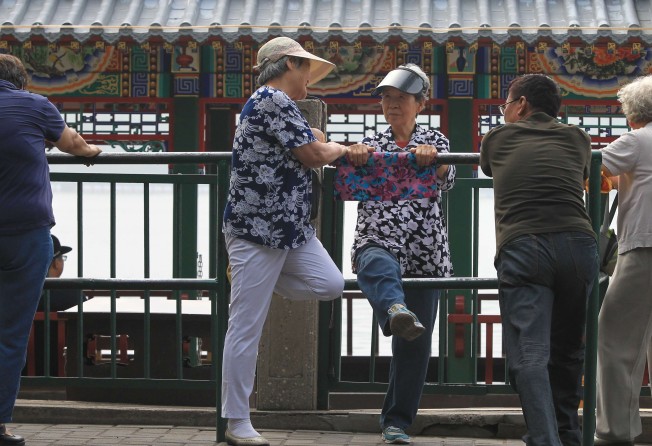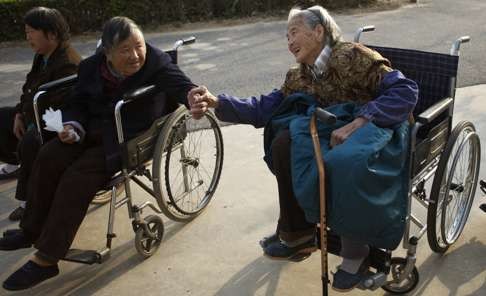Why foreign nursing home operators struggle to make a profit in China

China’s ageing population has attracted foreign elderly-care services providers to the country but they are struggling to make profits despite the market offering the largest number of senior citizens in the world.
Cascade Healthcare, a US nursing home operator, is profitable in China, four years after it began operating in the country, according to Nate McLemore, managing director of Columbia Pacific Management, Cascade’s parent company.
Japan’s Nichii Gakkan Co., operating in China since last year, is still trying to break even, according to He Jingwen, an analyst at SWS Research.
“China’s post-30s and post-40s generations get old before they get rich. That’s very different from the developed countries where the aged people hold the fortune,” she said, “It’s quite difficult to earn money from this generation.”
Haitong Securities analyst Yu Wenxin wrote in a research report that “surging demand and limited affordability” was the major problem facing China’s elderly-care industry today.
In 2012 the average annual disposable income for an urban Chinese was 24,600 yuan (HK$28,703), while the average price for a bed in a nursing home was 42,400 yuan per annum, Yu wrote.
The absence of tailored insurance schemes also discourages elder Chinese to spend money on health care.
Nichii, the largest nursing care business player in Japan, provides nursing homes and health care services to elderly Japanese while receiving subsidies from the government and insurance companies.
Japan introduced its long-term care insurance programme in 2000, with two schemes respectively targeting people aged between 40-65 and above 65.
The programme, which has become controversial in recent years due to surging costs from the rapidly ageing Japanese population, covers 90 per cent of expenditures for senior Japanese living in nursing homes or for those receiving home-visit care services, a study by SWS Research shows.
Ageing mainland Chinese, however, mostly rely on the sparse government pension and their children’s care for their retired life. Health care expenditure makes up 40 per cent of total spending by the elderly in developed countries, while in China the portion is only 20 per cent, He said.
Meanwhile, differences in retirement lifestyle might mean foreign operators take longer to adapt to the mainland market.
SWS’s He, who visited Cascade’s nursing home in Shanghai, said, “It is more like a hospital. The food is offered in a buffet-like style, but traditional Chinese prefer ordering food on a menu.”
Cascade is one of the mid to high-end nursing home operators in Shanghai, charging 4,000 to 6,500 yuan per bed a month. The occupancy rate is usually not high, she said. A Cascade spokesperson in Seattle said the company’s occupancy rate is over 74 per cent.
Overseas nursing home operators are more professional in offering medical care compared with their mainland peers, He said, adding that they will have an advantage in future when the post-50s and post-60s generations – who are wealthier than those 20 years older – are in need of elderly care services.

By 2015, China had 222 million people aged above 60 – more than any other country. They accounted for 16.1 per cent of the mainland population, according to China’s Ministry of Civil Affairs. That compares to 31 million people 65 years or older in Japan in 2014, who made up 25 per cent of the country’s total population.
By the end of 2050, 36.5 per cent of China’s population will be aged above 60, compared with 42.5 per cent in Japan, the United Nation’s World Population Prospects report shows.
However, unprofitability in the short term has not dampened investors’ passion in the promising industry in China.
In 2015, the world’s second largest economy saw the number of elderly-care institutions increase 23.4 per cent year on year to 116,000, with the total number of beds available in nursing homes rising 16.4 per cent year on year to 6.73 million, according to the Ministry of Civil Affairs report. The growth has coincided with the emergence of senior communities and senior housing projects around the country.
But the gap between demand and supply is still huge – for every 1,000 elderly Chinese there are only 30 beds available in nursing homes, the Ministry of Civil Affairs report shows.
For the time being, most nursing home operators in China are still “burning money” and looking for a sustainable business model, analysts said.
“The industry is so young. Most of the players are start ups,” He said, “The first round of mergers and acquisitions has just started. I think there will be big Chinese companies investing in the market within two years. For the time being, they don’t seem to be able to find investable assets.”
This article has been amended in the second paragraph to say that Cascade Healthcare started to be profitable in China this year.